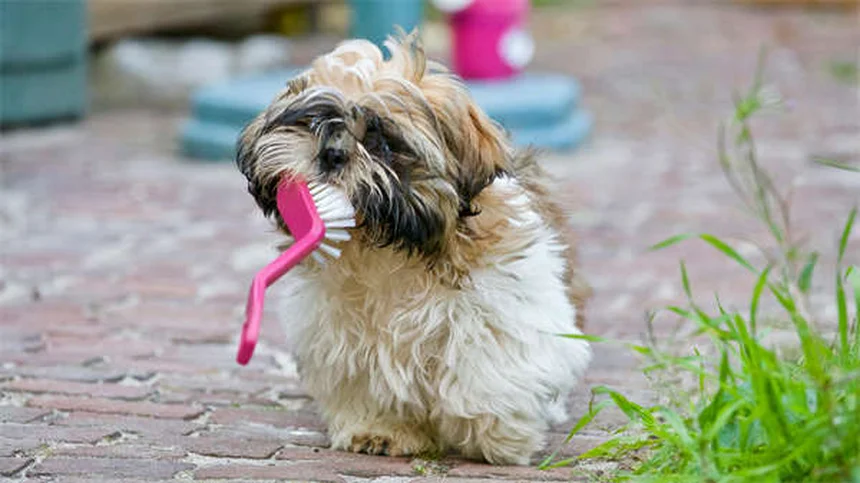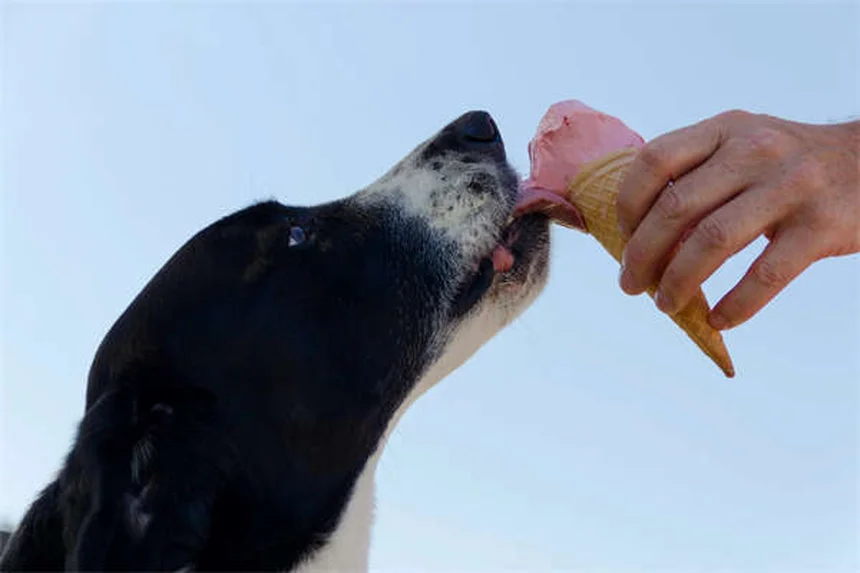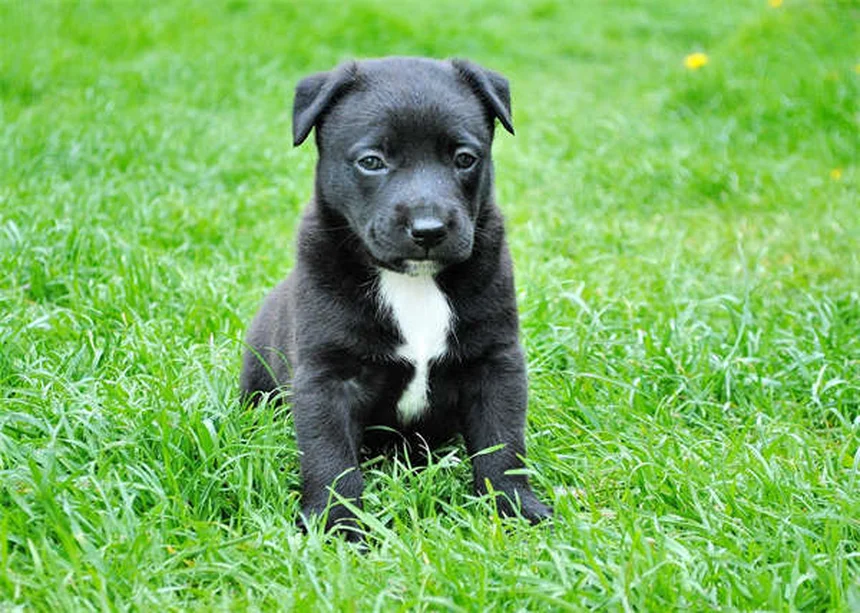Why is my dog not social? The answer is simple: some dogs are naturally loners, and that's completely normal! Just like humans, dogs have unique personalities - while many are social butterflies, others prefer quiet companionship. If your dog seems happy and healthy but doesn't seek out interactions with other dogs or people, there's likely nothing wrong. In fact, breeds like Akitas and Chow Chows are known for being particularly selective about their friendships.I've worked with hundreds of dogs over the years, and let me tell you - the loner dogs often make the most devoted companions to their chosen humans. The key is understanding your dog's individual needs rather than forcing them to conform to social expectations. Whether your pup is the life of the party or prefers solitary sniffing adventures, we'll explore how to help them thrive exactly as they are!
E.g. :Lost Dog? 5 Proven Steps to Bring Your Pup Home Fast
Advertisement
- 1、Understanding Your Dog's Personality
- 2、The Science Behind Solo Dogs
- 3、Thriving With Your Independent Pup
- 4、Debunking the "Perfect Dog" Myth
- 5、The Hidden Benefits of Independent Dogs
- 6、Training Approaches That Actually Work
- 7、Celebrating Their Unique Qualities
- 8、Creating Their Perfect Environment
- 9、FAQs
Understanding Your Dog's Personality
Not All Dogs Are Social Butterflies
Let's be honest—we all know that one golden retriever who acts like they're running for mayor of Dogtown. But guess what? Your dog isn't broken if they'd rather sniff flowers alone than join the puppy mosh pit. Some dogs are just born introverts, and that's perfectly okay!
Think about it this way: in human terms, we've got party animals and bookworms. Dogs are no different! While 60% of dogs thrive in social situations, studies show about 15-20% prefer their own company. Here's a quick comparison:
| Social Dogs | Loner Dogs |
|---|---|
| Initiate play with strangers | Observe from a distance |
| Wag entire body when greeting | Might do a polite tail flick |
| Love dog parks | Prefer solo walks |
Spotting the Difference: Shy vs Selective
Here's where things get interesting. How can you tell if your dog is truly a loner or just nervous? Great question! A confident loner dog will:
- Approach new people/dogs on their own terms
- Show relaxed body language (loose tail, soft eyes)
- Move away calmly when overwhelmed
Meanwhile, a fearful dog might tremble, tuck their tail, or show whale eye (that whites-of-the-eyes look). If you're seeing these stress signals, that's when we might want to help build their confidence.
The Science Behind Solo Dogs
 Photos provided by pixabay
Photos provided by pixabay
Nature vs Nurture: Why Some Dogs Fly Solo
Ever met a standoffish Labrador or a social butterfly Shiba Inu? Breed tendencies aren't destiny! While livestock guardians are bred for independence and retrievers for sociability, every dog is an individual. My neighbor's Great Pyrenees thinks he's a lapdog—go figure!
Early experiences matter too. Puppies who missed critical socialization windows (between 3-14 weeks) might be wary of novelty. But here's the kicker—some dogs are just born preferring quiet companionship. And you know what? That's their right!
When to Worry About Changes
Here's a pro tip: if your normally affectionate pup suddenly becomes withdrawn, schedule a vet visit. We're talking about changes like:
- No longer greeting you at the door
- Avoiding favorite activities
- New sensitivity to touch
These could signal pain or illness. But if your dog has always been Mr. Independent? That's just their personality shining through!
Thriving With Your Independent Pup
Respecting Boundaries 101
Would you want someone forcing hugs on you all day? Probably not! Your dog deserves the same courtesy. Try the "three-second rule": pet for three seconds, then pause. If they lean in for more, continue. If they walk away? That's their choice, and we respect that.
For visitors, I teach the "treat and retreat" method: have guests toss high-value treats (think chicken bits!) without making direct contact. This builds positive associations while honoring your dog's space.
 Photos provided by pixabay
Photos provided by pixabay
Nature vs Nurture: Why Some Dogs Fly Solo
Forced playdates are so last decade. Instead, try parallel walks with another calm dog—no direct interaction needed! Over time, your dog might choose to sniff their walking buddy. Or not. Both outcomes are wins!
Remember when I mentioned my neighbor's Pyrenees? We discovered he loves watching other dogs... from across the street. His version of social media, I guess!
Debunking the "Perfect Dog" Myth
Redefining Canine Happiness
Society tells us dogs should be grinning, tail-wagging socialites. But guess what? Your dog's version of joy might look different. Maybe it's:
- Sunbathing alone in the yard
- Chewing a bone in peaceful solitude
- Following you from room to room (but not cuddling)
These are all valid expressions of canine contentment. As long as basic needs are met and there's no distress, we're golden.
The Gift of Understanding
Independent dogs teach us beautiful lessons about consent and respecting boundaries. Their love might be quieter—a gentle lean against your leg, watching you from across the room—but it's no less meaningful.
So next time someone says "Why doesn't your dog play with others?", just smile and say "She's got better things to do." Because in the end, the only opinion that matters is the one wagging (or not wagging) at the end of the leash!
The Hidden Benefits of Independent Dogs
 Photos provided by pixabay
Photos provided by pixabay
Nature vs Nurture: Why Some Dogs Fly Solo
You know what's fascinating? Those dogs who prefer observing from the sidelines often show higher problem-solving skills than their social butterfly counterparts. While the golden retrievers are busy making friends, your independent thinker might be figuring out how to open the treat cabinet!
Studies at canine cognition centers found that dogs who spend more time observing rather than interacting tend to:
- Learn commands faster when they choose to engage
- Remember solutions to puzzles longer
- Show more creative approaches to challenges
The Perfect Companion for Introverted Humans
Let's be real - not all of us want a dog that's constantly demanding attention. Isn't it refreshing to have a companion who understands the value of quiet time? Absolutely! Many introverted owners report deeper bonds with their independent dogs because they share similar social batteries.
My bookworm friend Sarah has the perfect arrangement with her basset hound Winston. She reads for hours while he snoozes at her feet. When they do interact, it's quality over quantity - their version of a perfect Sunday!
Training Approaches That Actually Work
Motivating the Strong-Silent Type
Forget the standard training advice - your independent dog needs a different playbook. Here's what works wonders:
| Traditional Approach | Independent Dog Hack |
|---|---|
| Loud, enthusiastic praise | Subtle ear scratches or quiet "good" |
| Group training classes | One-on-one sessions at home |
| Repetitive drills | Short, varied challenges |
The key is respecting their learning style. These dogs often respond better to mental stimulation than emotional displays. Try hiding treats in puzzle toys instead of forcing interaction!
Building Confidence Without Overwhelming
If your dog does need a confidence boost, take it sloooow. We're talking baby steps:
- Start by sitting together in quiet parks
- Gradually move to slightly busier locations
- Always let them retreat to a safe space
Remember my neighbor's Pyrenees? We discovered he actually enjoys watching kids play soccer... from 50 yards away. That's his version of socializing, and that's perfectly okay!
Celebrating Their Unique Qualities
The Joys of Low-Maintenance Companionship
Let's count the ways independent dogs make life easier:
- No separation anxiety when you leave the house
- Minimal begging at dinner parties
- Perfect movie-watching buddies (no constant demands for pets)
My cousin's greyhound, Duchess, has mastered the art of coexistence. She'll greet guests politely, then retreat to her bed - the canine equivalent of "I'm here if you need me, but I won't intrude."
When They Choose to Connect, It Means More
Isn't it special when an independent dog seeks you out? You bet! Those moments when they voluntarily curl up beside you or bring you a toy carry extra weight because you know it's 100% their choice.
I'll never forget when my usually aloof shepherd mix rested his head on my knee during a tough day. No training could create that genuine connection - it came from mutual understanding and respect.
Creating Their Perfect Environment
Designing a Sanctuary for Solo Dogs
Your independent pup will thrive with these simple adjustments:
- Create cozy retreat spaces (think igloo beds or quiet corners)
- Use baby gates to give them an "off-duty" area
- Provide engaging solo activities like sniff mats or chew toys
My friend turned her walk-in closet into a doggy zen den with soft lighting and calming music. Her shar-pei now voluntarily goes there to recharge - it's like her personal spa!
Reading Their Subtle Communication
Independent dogs often speak in whispers rather than shouts. Learn their language:
- A slight tail wag when you enter the room
- Bringing a toy and dropping it near you (not demanding play)
- Sleeping facing the door (their way of keeping watch)
These subtle signs show they're engaged with you on their terms. Once you learn to read them, you'll discover a whole new dimension to your bond!
E.g. :Is there such a thing as a loner dog? : r/Dogtraining
FAQs
Q: Is it bad if my dog doesn't like other dogs?
A: Not at all! Many perfectly happy dogs prefer human company or solitude over playing with other dogs. As long as your dog isn't showing aggression or extreme fear around other dogs, their preference is completely normal. Some breeds like Shiba Inus and Basenjis are famously selective about canine friendships. The important thing is that your dog has appropriate coping skills when they do encounter other dogs - meaning they can politely ignore or walk away rather than reacting negatively. Forced socialization often backfires, so it's better to respect your dog's personality.
Q: Can I train my loner dog to be more social?
A: While you can gently encourage positive experiences, you can't fundamentally change your dog's personality - and that's okay! Focus on helping your dog feel comfortable in various situations rather than forcing interactions. I recommend starting with parallel walks (walking near another calm dog without direct contact) and using high-value treats to create positive associations. But remember, progress should be measured in small steps your dog chooses to take. If after several months your dog still prefers solitude, that's their authentic self expressing itself!
Q: How do I know if my dog is a loner or just scared?
A: Great question! The key difference is in body language. A confident loner dog will approach new situations calmly, investigate if interested, and walk away without stress signals when they've had enough. Their tail and ears remain neutral, and they might even accept treats from strangers. A fearful dog will show clear stress signs: tucked tail, whale eye (showing whites of eyes), trembling, or attempts to flee. If you're unsure, consult a certified professional dog trainer who uses positive reinforcement methods to help assess your dog's comfort level.
Q: Should I still take my loner dog to the dog park?
A: Honestly? Probably not. Dog parks can be overwhelming even for social dogs, and forcing a loner dog into that environment often creates unnecessary stress. Instead, consider these alternatives: sniffari walks where your dog explores new environments at their own pace, backyard playdates with one carefully selected calm dog, or even doggy daycare facilities that offer private suites. Remember, quality of life matters more than quantity of dog friends when it comes to our canine companions!
Q: My dog doesn't even like cuddling with me - is this normal?
A: Absolutely! Some dogs show affection in less physical ways. Your dog might express love by following you from room to room, bringing you toys, or simply enjoying your quiet company. Try noticing the subtle ways your dog connects with you - maybe it's a gentle lean against your leg or contented sighs when you're nearby. As long as your dog seeks some form of interaction with you (even if it's just being in the same room), they're still bonded to you - just on their own terms!

